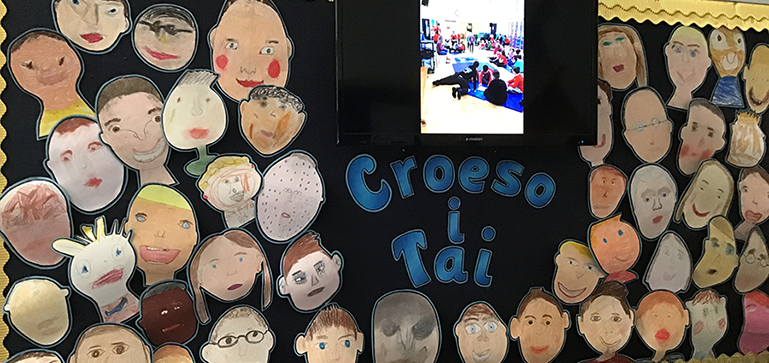Designing a pupil-led curriculum

Quick links:
Information about the school
The Tai Education Centre is a local authority run PRU for up to 56 primary age pupils. It provides education for pupils in the foundation phase and key stage 2 experiencing social, emotional and behavioural difficulties. There are increasing numbers of pupils who also present with additional needs such as Autistic Spectrum Disorder or Attention Deficit Disorder and a range of other additional needs.
Almost half of pupils have a statement of educational needs and are eligible for free school meals.
Context and background to the effective or innovative practice
Pupils often begin their journey in Tai Education Centre disengaged from education having had negative experiences in previous schools. In September 2018, pupils faced an additional challenge as the Centre moved premises. This initially had a negative impact on the pupils’ wellbeing and behaviour. At this time, the Centre was also conducting audits and planning for a Curriculum for Wales.
Staff have a strong track-record of successful collaborative working and feel that, in order for pupils to re-engage with education successfully, it is imperative that the curriculum is pupil led and meaningful. Pupil voice is therefore an integral part of developing the curriculum, with all work adjusted to enable every child to succeed. The motto ‘Learning Together’ is embedded throughout the whole setting and is paramount to the team work approach, enabling both pupils and staff to learn and succeed. This whole-school planning approach has been adopted in Tai and the principles of the new curriculum have been embedded throughout the school.
Description of nature of strategy or activity
Tai Centre is a Pioneer School for Professional Learning. All staff have been involved in training sessions, ensuring equity and consistency about new initiatives and developments throughout the setting. Staff are passionate about providing pupils with a curriculum that is exciting, fun, relevant, meaningful and appropriate to each individual’s needs.
Pupils undertake baseline assessments on entry to Tai. This assessment enables teachers to have an immediate understanding of their level of ability. Pupils then set individual targets along with staff as part of their Personal Development Plan. These are working documents, which are updated frequently involving all stakeholders, enhancing effective planning. Half termly pupil progress reviews are held, quickly identifying suitable progress or underperformance. This enables early identification of interventions to support and challenge pupils effectively.
Planning has been revised so that medium term planning incorporates the four core purposes and the six Areas of Learning Experiences (AOLE) in A Curriculum for Wales, together with the National Literacy and Numeracy, and Digital Competency Frameworks. Pupil voice is the driving force behind the school’s curriculum planning. Pupils identify whole-school topics and decide what they want to learn and how they will learn it. From this, staff share ideas, knowledge and skills within the PRU’s own AOLE groups, which involves all teaching and support staff. Team work is regarded as paramount towards making improvements in the curriculum offer and outcomes.
Immersion days begin each new topic and involve all staff and pupils embracing a whole-school theme. All topics focus on ‘real life’ contexts such as using money in businesses. Typically, the immersion involves staff dressing up in theme related clothes and challenges being set for pupils, classes and specific groups of learners. This enables each whole-school topic to be introduced in a fun, intriguing, meaningful way for both staff and pupils.
In addition to the themed approach, there has been a whole-school focus on meeting individual pupils’ needs well and creating and enhancing pupils’ independence. This approach has enabled pupils to be more confident at identifying their own ability and knowing how to challenge themselves. Many pupils are developing a range of independent skills effectively and using these skills more successfully in their mainstream school.
Parents, carers and stakeholders are also involved in the learning process, with parent courses and ‘show cases’ held regularly. This has a positive effect in enhancing their own learning and their child’s.
What impact has this work had on provision and learners’ standards?
Nearly all pupils at Tai Education Centre make particularly strong progress in relation to their starting points, which is often from a very low baseline. Pupils thoroughly enjoy having ownership of and designing their own curriculum. This approach has had an extremely positive impact on their learning and behaviour. Levels of engagement and motivation across the school have improved and nearly all pupils make strong progress in developing their self-esteem and belief in themselves as successful learners. This is reflected in their points and achievement of targets. The learning, quality of work and progress of all groups of pupils show that they achieve exceptionally well and nearly all pupils achieve their personalised learning targets. Reintegration has also improved, as has the behaviour and wellbeing of the pupils, with a reduction in exclusions and behaviour incidents.
There is also an increased confidence amongst staff to share expertise and to embrace their own professional learning.
How have you shared your good practice?
The PRU works extremely closely its mainstream schools. Ideas, skills and strategies are shared weekly and schools are invited to all events and reviews.
Training sessions have been delivered within local and regional improvement groups and non-Pioneer schools within the local consortium and learning resource base classes.